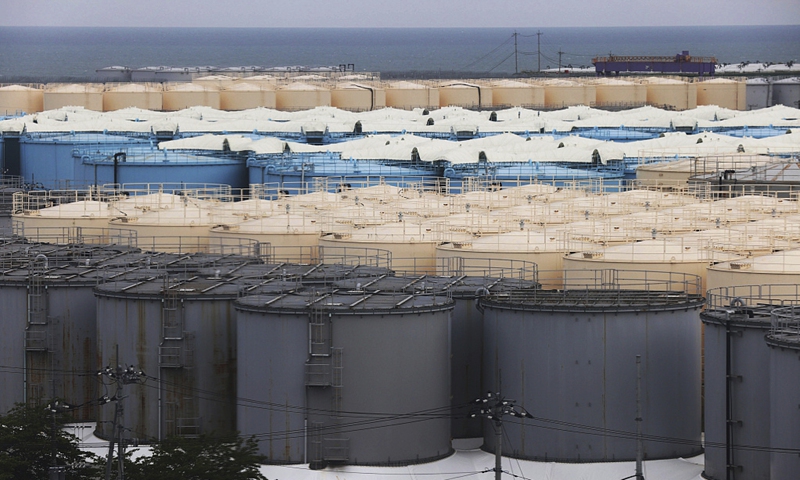
Water tanks near Fukushima Daiichi nuclear power plant in Okuma town of Fukushima prefecture on May 26, 2023 Photo: VCG
Another scandal concerning Fukushima nuclear accident was exposed as Japanese construction workers have been found selling scrap iron, which may be contaminated by the radioactive substances from the Fukushima Daiichi nuclear power plant, for personal gain.
The scrap iron taken and sold for money without permission was from the construction site in Okuma town of Fukushima prefecture, which has become a "home difficult to return to" adjacent to the crippled Fukushima Daiichi nuclear power plant.
According to Mainichi shinbun, several building workers have repeatedly, at least on seven occasions from April to June, removed the untested and potentially nuclear-contaminated waste iron and copper wire away from the construction site of the Okuma Town Library and Folklore Heritage Museum, and sold them, yielding a profit of about 900,000 Japanese yen (roughly $6,100)
The rise of scrap iron prices is considered one of the factors behind the incident, Nikkei reported. According to industry groups, the selling price of scrap iron in August was about 50,000 Japanese yen per ton, about twice of the price in August 2019.
When dealing with the radioactive waste, Japan's Ministry of the Environment required to first conduct radioactive concentration testing at designated temporary storage points. The waste with a radiation concentration exceeding 100,000 becquerels per kilogram should be sent to a storage facility near the Fukushima Daiichi nuclear power plant, while those below 100,000 becquerels will be put into dedicated disposal site in Fukushima.
As the investigation about the radioactive material content contained within the scrap iron and about the buyers is underway, Japanese Environment Minister Shintaro Ito expressed his regret over the case, saying the ministry will provide strong guidance and supervision to ensure proper handling.
"The transportation and trading of the untested scrap iron and copper wire may lead to the spread of radioactive substances and trigger social panic. The incident is another example of Japan's inability to properly handle the nuclear accident," Da Zhigang, director of the Institute of Northeast Asian Studies at Heilongjiang Provincial Academy of Social Sciences, told the Global Times on Wednesday.
Da said the transparency of information released by the Japanese government and its problem-solving capabilities and attitude have been questioned by both the Japanese public and the international community as scandals kept emerging such as Tokyo Electric Power Company (TEPCO) has been repeatedly tampering with test data and concealing safety issues at nuclear power plants.
These scandals reflected the chaotic situation of Japan's internal management, which gave people sufficient reason to believe there are huge safety risks and loopholes in its dumping of nuclear-contaminated wastewater.
Despite of strong opposition from neighboring countries and from within, the Japanese government and TEPCO have continued dumping the nuclear-contaminated water into the Pacific Ocean since late August.
In addition to the nuclear-contaminated wastewater, there is also a great amount of soil and buildings contaminated by nuclear radiation in Japan which urgently need proper treatment, Da said.




